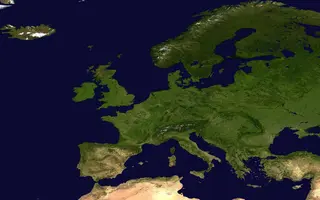
Capping 2011’s first quarter results, March stays in line with the continued growth of global performance of the hotel industry within the 27 countries of the European Union. In March, the two indexes remain positive, with a slight improvement in Occupancy Rate and a stronger push upward in Average Daily Rates. Therefore, the +5.7% growth in RevPAR across the board confirms the two preceding months’ trends (+7.5% and +5.3%) and forecasts a rather promising spring. For the first quarter 2011, European RevPAR posts a +5.9% growth.
On a global level, for the whole quarter, the balanced nature of supply of chain hotels in different countries across the region (strong Economy segment in Western Europe, and a predominance of Upscale hotels in Eastern Europe) limits the variations between the different hotel categories. Nevertheless, in the great majority of the countries, it’s the high-end sector that is responsible for the steady growth of RevPAR since the beginning of the year because they are taking advantage before anyone else of the comeback of overseas and intra-european business travel. Although occupancy growth is still modest, the average rates of the four and five star segments are clearly improving.Looking at the actual pace of the European RevPAR variation, performances of hotel chains in the 27 countries of the European Union follow the forecasts stated at the beginning of the year by MKG Hospitality’s analysts, between 4.5% and 5.5% yearly.If performance from the European Union is globally and individually positive, there are however strong disparities. Among the “heavy-weight” hotel markets that usually support the growth of the hotel cycle (Germany, France, and the United Kingdom), France’s position was an exception last March. For all sort of circumstantial reasons (Change in dates for spring break, elections, few MICE events), occupancy rates declined, which surprised a number of hoteliers. It didn’t affect sales strategy and average rates allowed them to compensate for this minor weakness. It seems that the month of April already put an end to this temporary glitch. In Germany, as in the United Kingdom, the trend is stronger. Rates, whatever their category, are still gaining some points as the Average Daily Rates are growing steadily. Germany’s fiscal relaunch policy continues its mission of making up for past losses, even if it doesn’t produce the same spectacular growth posted the year before. On a smaller level, Belgium and the Netherlands are on the same wavelength, even if the Netherlands also recorded a minor weakness last March in the economic category.Countries in southern Europe are also engaged in a race to attain their pre-crisis results. Spain is starting to reap the benefits of the “North Africa” effect, meaning that tour operators are sending their clients to the Balearic and Canary islands because of the loss of beaches in the “affordable sunbelt” in the Southern Mediterranean. This also affects Portugal and Greece, which is slowly coming back on line after a difficult start in 2011. However, Italy is not considered an alternative destination and is committed to holding an aggressive price policy to maintain its hotel occupancy. In Central Europe, the calendar of conferences is weighing down on performance. Austria is the flavour of the month of March with a 26% growth in RevPAR coming from Vienna’s excellent results, a capital which is in the lead of European cities popular for international conventions. Poland is slowly growing ahead of its capital’s problems with overcapacity. The other good news, in Scandinavia, come from Denmark, which finally erased the effects from the wide delta between 2009 and 2010. Indeed, the absence of international Climate and Environment conferences plummeted its results throughout 2010. The cycle is now turning on solid ground from the economic upturn.«One should pay particular attention to near 6% growth in European RevPAR during the entire first quarter 2011 while the base effect is already less visible as opposed to previous months. Indeed, the hotel cycle started to really turn around as of March 2010», comments Georges Panayotis, President & CEO of MKG Group. «The first quarter’s good results should remain present in the months to come because the unfavourable worldwide geopolitical situation encourages Europeans to travel within their borders».Looking at the actual pace of the European RevPAR variation, performances of hotel chains in the 27 countries of the European Union follow the forecasts stated at the beginning of the year by MKG Hospitality’s analysts, between 4.5% and 5.5% yearly.




